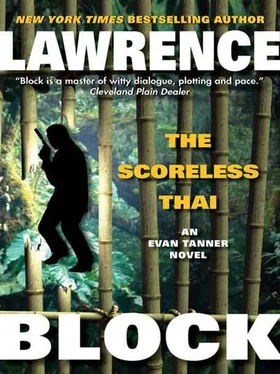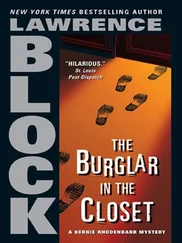I had two fishes and could have eaten more, but I was afraid of hitting my stomach with too much too soon. Dhang wanted to make camp for the night. I talked him out of it. He and Tuppence could sleep as safely in the boat as on dry land, and we would make much better time if we kept going through the night. I didn’t mind paddling all night long. I felt it would be less nerve-wracking than sitting around listening to the jungle noises while the two of them slept.
We drowned the campfire, climbed into the boat, and pushed it back into the current. The river seemed wider than when we had started out, which rather stood to reason, since widening is a propensity of rivers, along with flowing into oceans. Tuppence sat in the stern this time, Dhang took up his post in the bow, and I was in the middle. This was ideal from a conversational standpoint; since I was the only one who could converse with both of the others, it was a logical spot for me.
First I talked with Dhang, who assured me he had kept his hands off my woman, although he admitted that the effort was becoming exceedingly difficult for him. He launched into an unembarrassed discussion of Tuppence’s anatomical virtues and the uses to which various portions of her could be put, and I decided that it was just as well she couldn’t understand a word he was saying.
Then I talked with Tuppence, and she went over the story of the capture and all the rest. It came through more or less as it had while I was delirious with fever but made a little more sense this time. Evidently the musicians were picked as pawns in a rather elaborate plot to discredit both the United States and the Souvanna Phouma neutralist regime in southern Laos. By returning the jewels and the heads of the Kendall Bayard Quartet, the Pathet Lao would show himself to be a staunch friend of Thailand and an implacable enemy of the thievery and deception that characterized U.S. imperialism. Now I could appreciate Tuppence’s insistence upon recovering the jewels before we left the Tao Dan command post. If they stayed in Communist hands, the whole scheme could have been carried out more or less as planned.
But now, if our side returned the gems, the diplomatic tables would be turned. The Pathet Lao would get a black eye, American intelligence would come off looking good, State Department goodwill tours would not suffer a loss of prestige, and the Chief’s faith in Evan Tanner would burn more brilliantly than ever. The CIA would retain its mandate to use Bangkok as a launching pad for Oriental fun and games, and the old Francophile in Tao Dan would not have died in vain.
I frankly wonder how much effect these little international ploys and counterploys have on the course of world events. Not very much, I suspect. Another report is filed in capitals throughout the world, another affair makes newspaper headlines for a day or three, and then the world returns to its usual routine of hypocrisy and intermittent violence. One throws a stone into a pool and attaches great significance to the manner in which ripple after ripple passes concentrically outward to the water’s edge, but in truth once the ripples stop, the pool is as it was before, with the same water in it.
The Chief, I know, finds worlds of meaning in little gambits like this one. This only stands to reason – it is a rare man indeed who plays down the significance of his own life’s work. Or perhaps, professional that he is, the Chief has outgrown the habit of looking at the greater implications of things. Perhaps instead he merely sees each little affair as an incident in an international game, worth a certain number of points on a worldwide scorecard, worth other points on another scorecard in which he is pitted against the CIA and military intelligence and the other game-playing agencies.
I decided that I did not too much care. I had come here because I thought Tuppence was in trouble, which turned out to be a massive understatement, and I had found and rescued Tuppence, and now we were on our way back to what we persist in calling civilization. If it made the Chief happy, that was an added bonus.
I just wanted to get home.
After the sun went down, there was a brief spell of rain. We got fairly well soaked, but it didn’t last long enough to be really bad. Then the sky cleared, and there was enough of a moon to provide adequate visibility for nighttime paddling. Dhang paddled until he got tired. Then I took over. Tuppence stayed awake for a while before dozing off in the middle of a conversation. I kept paddling on through the night. The river was quite empty, the jungle alive with night sounds that I now found rather comforting. A jungle, I decided, was not quite so hostile a place as we are led to believe. I could understand now how people might choose to live their lives in it.
From time to time I pulled the paddle inside the boat and closed my eyes and rested. I felt completely recovered, and long before dawn I was hungry again. When the sky lightened, we beached the boat, and Dhang and I went out to look for food. I found some fruit that he told me was poisonous, and he brained a few lizards with the butt of his pistol and seemed surprised when Tuppence and I showed little enthusiasm for them. He managed to unearth some edible roots, and I picked some non-poisonous berries. Tuppence and I made do with them. Dhang roasted the lizards and seemed to enjoy them considerably.
Around noon we stopped the boat again, and Dhang and I went exploring. We saw smoke rising off to our right and headed toward it, moving silently through the jungle. We had been a long time without seeing any other human beings. Where there is smoke there is also fire and often food, and living off the jungle can have its limitations.
We crept close to the campsite. Through a break in the undergrowth I saw uniformed men sitting around a campfire, talking and laughing. I listened closely but could not understand what they were saying. Whatever language they were speaking, it was not one I recognized. Dhang couldn’t make it out either.
Some tribal dialect, I decided. I considered making ourselves known to them, then decided against it. If we didn’t have a language in common with them, things could be extremely difficult. In all probability they were Laotian regulars, probably an antiguerrilla force. Dhang was still dressed in the uniform he had donned in Tao Dan, the uniform of a Pathet Laoist. If we couldn’t tell them who we were, and if we couldn’t be sure just who they were, things could get sticky. So we slipped away as silently as we had come, found Tuppence, got back into our dugout, and headed downstream once more.
And then, late in the afternoon, we heard a plane flying overhead. Dhang noticed it first. We heard the engines droning long before we caught sight of the craft and we craned our heads upward for a look at it, and the pilot came down for a look at us.
It was a jet fighter. I couldn’t recognize the model but when it swooped downward, I made out U.S. Air Force insignia on the undersides of the swept-back wings.
“It’s one of ours,” I said, and Tuppence and I began to wave furiously, and the plane continued its downward sweep.
And bullets plowed a furrow in the water beside us.
“Evan! The mother’s shooting at us!”
He missed us completely on that run. He came out of his dive, swung into a graceful turn, and headed our way again, machine guns open. The silly son of a bitch was trying to kill us.
“Overboard,” I shouted. “Swim for shore! Fast!”
We leaped out of the dugout and into the water. Bullets riddled the water around us. I grabbed Tuppence and swam furiously for land. Dhang was off to the right, cutting the water with clean, brisk strokes. The pilot finished his run, made another illegal U-turn, and came back a third time.
We reached the bank, clambered ashore, dove into the cover of an overhang of vines and shrubs. The fighter let us alone and concentrated on the dugout. He made three more strafing runs at it and by now he was getting the hang of it. Bullets tore into the hollow wooden shell. By the end of the third run enough holes had been opened up, and the dugout had filled with water. It didn’t exactly sink – it was, after all, wood – but its days of service were over. It was filled with water to the top. It was useless to us, and so were our guns.
Читать дальше












